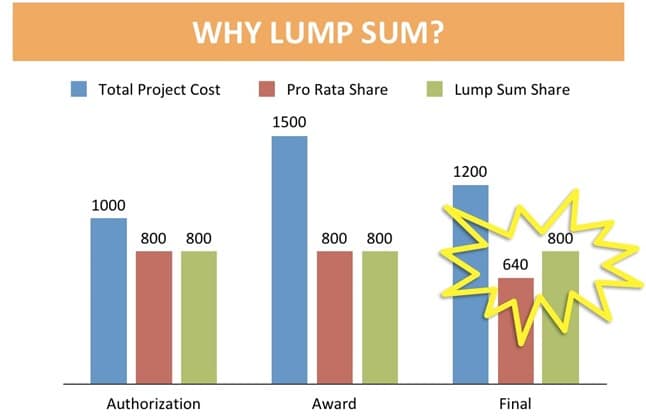In lump sum construction contract contractor bids a single fixed price for all activities in the project scope. This method is particularly used for large construction projects and is a conventional but most popular types of construction contract.
The contractor bears the risks associated with this contract and is responsible for estimating project costs from drawings including overhead and his profit to determine the price of the project.
Lump sum construction contract is considered as the most effective means of reducing construction price and is useful when projects and its activities are well defined.

Advantages of Lump Sum Construction Contract
Lump sum construction contract is the most widely accepted contract between the owner and the contractor due to it general predictability, easy management and assured maximum price arrangements.
Advantages of Lump Sum Construction Contract for Owner are as follows:
- There is certain degree of limitation over owner’s exposure as well as accountability at the time construction since he has already agreed upon a fixed rate.
- Since the contractor has accepted a fixed price for the construction, the owner is not liable for any over expenditure. This is the most important benefit.
- It is much simpler to get construction loan with a Lump sum contract as it provides a high degree of certainty as far as cost is concerned.
- It is much easier to supervise and manage Lump sum contracts.
- The payments are made after fixed durations and that too based on the amount of work completed unlike the balloon payments in other arrangements.

Advantages of Lump Sum Construction Contract for the Contractor are as follows:
There is a greater margin for profit realization for contractors as well as designers.
Due to its general reliability, contractors try to enhance quality of production and performance and try to complete work faster.
Lump sum contracts offer comparatively easier assessment of soil conditions, bidding prices and pre- construction analysis which makes selection process less tedious.
Accounting related to lump sum contracts are low-intensive that diminishes overhead expenses of the contractor and allow for stable cash flow.
Besides above benefits, lump sum construction contract promote better interaction and association between the owner, contractor and designer. The contractors encourage effective project execution to earn better profit margin. The owner is also aware of the expense incurred due to change orders he needs.
Disadvantages of Lump Sum Construction Contract
Lump sum contracts pose greater risk to contractor.
Quantifying changes is a big challenge. Such contracts demand documentation and record keeping of change orders at all stages that further requires more paperwork.
Rejection of change order requested by the employer.
The building and construction design and plans have to be completed well before beginning the execution of activities.
The overall construction completion could take longer than other contractual alternatives.
Since the contract is based on fixed price, the contractor may start using sub-standard means and methods and products. In such a case, the owner should specify building materials well in advance.
Lump-sum contracts usually end up with higher fixed price to cover unforeseen circumstances. Owners are responsible for unpredicted conditions which are beyond the control of either party.
Matters of Disputes in Lump Sum Construction Contract
Even though Lump sum contracts are considered ideal for smaller construction projects, they could lead to dispute and claims arising out of contract agreements. The most disputable issues are:
- Unbalanced Bids
Certain projects need submission of payment applications using unit quantities and unit prices. In such a case, the contractor may produce an unbalanced bid by raising unit prices on such items required early in the building process like transportation and insurances and reducing unit price on materials which have to be used later.
- Change Orders
In case of change order proposals suggested or received by the owner that may demand increased expenses, the rate quotation could lead to disagreements.
- Changes related to Scope and Design
Based on construction procedures and past experience, the contractor can suggest design changes. Contract provisions should be able to explain how those alterations in plan will be addressed and who will bear the add-on expenses.
- Compensation for Early Completion
Lump sum contracts may consist of provision for an early completion compensation for the contractor.
The above issues emphasize the fact that the fixed price provision in the contractual document of Lump-sum contract is far from being permanent and are very much liable to changes and alterations. Undeniably cost certainty is a major hiccup on any project and lump sum contracts are no different.
Types of Variations in Lump Sum Contracts
Lump sum contractallocates more risk to the contractor when compared to some other types of construction contracts because the process of tender preparation is more expensive for the contractor. Therefore, a clear mechanism has to be put in place to address varying conditions during the course construction by adding necessary provisions:
- Variations
In a lump sum contract, even though the amount of work and its price are well defined, there is always scope for changes or up gradations. To cover such changes, agreements should include terms for contractors to go ahead with such design, material or quantity alteration without having to argue about expenses.
It’s essential that contracts include an efficient variation and valuation process.
- Relevant events
This may include failure on the part of client to procure supplies or provide timely instructions to contractor or those events over which neither party have any control like inclement weather condition or natural disasters. In either case, such clauses should be included in the contracts that provide reimbursement for losses to contractor.
- Provisional sum
This is usually applicable in cases where the client may not opt to pay for undefined work. That is why a provisional sum is included in the contract document as an estimate of the total cost of construction.
- Fluctuations in Inflation
Sound provisions should be added to the contracts to suitably compensate contractors in case of inflations on projects especially those which last for a length of time. The reason being tenders are based on current price and contractor should be paid in case of price change that occur during the entire period.
- There should be clear clauses that include payments to subcontractors and other suppliers
theconstructor.org















